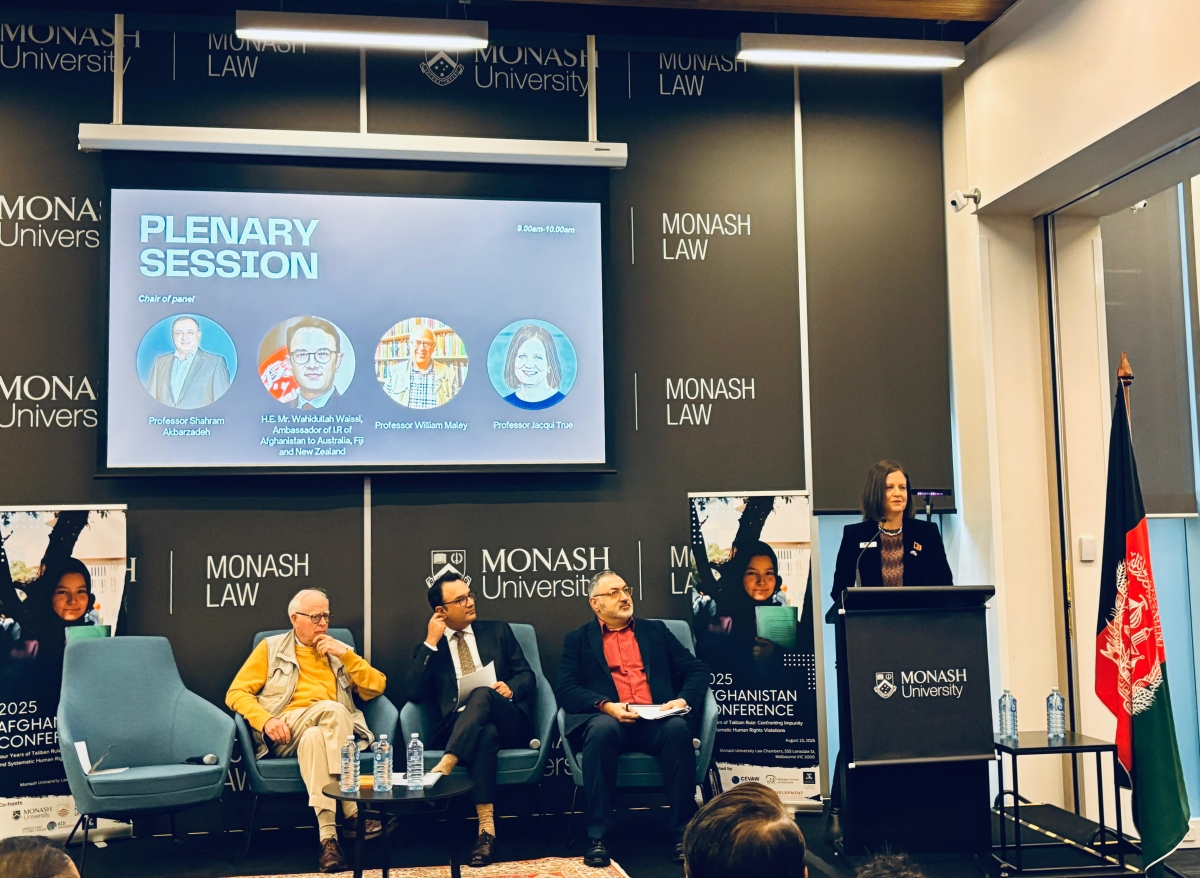Afghanistan Conference 2025 Calls for Coordinated Action
Four Years of Taliban Rule: Confronting Impunity and Systematic Human Rights Violations
On 15 August 2025, leading academics, human rights advocates, and members of the Afghan community in Australia gathered in Melbourne for the “Afghanistan Conference 2025: Four Years of Taliban Rule – Confronting Impunity and Systematic Human Rights Violations.” Organised with the support of five major Australian universities — Monash University, the University of Melbourne, Deakin University, the University of New South Wales and the Australian National University — the event offered an important platform to assess the deepening crisis in Afghanistan and to explore pathways for collective international response.
Marking four years since the fall of the Republic, the one-day conference brought together over one hundred experts to examine Afghanistan’s human rights, social and diplomatic situation under Taliban rule. The panels were led by Afghan scholars and specialists and covered topics ranging from gender apartheid and freedom of expression to accountability for international crimes and the persecution of ethnic and religious minorities.
This was the second in a series of academic and policy events focusing on Afghanistan’s human rights situation and the search for long-term solutions. The first conference in the series was held in August 2024, also in Melbourne.
In the opening address – livestreamed from the venue – Ambassador Wahidullah Waissi emphasised the need for alignment between international institutions, civil society organisations and individual advocacy efforts to protect the rights of the Afghan people. He stressed that Taliban rule is not the outcome of cultural tradition, but a deliberate political architecture designed to centralise power, exclude half of society and suppress all dissent. The Ambassador reminded participants that governing exclusively through decrees, destroying social equality and denying fundamental freedoms cannot qualify as legitimate rule under international norms. Since their return in 2021, the Taliban have issued more than 150 decrees, nearly 80 of which specifically target women, restricting their education, employment and participation in public life.
Other keynote speakers reinforced the urgency of a coordinated international response. Professor Jacqui True, Director of the Gender, Peace and Security Centre at Monash University, highlighted the broader sociological impact of the crisis, noting that women face not only legal restrictions but increasing social isolation that requires long-term strategies for social reconstruction. Professor William Maley underscored that the international community must move beyond passive monitoring and establish proactive and well-resourced protective mechanisms to defend the rights of the Afghan population.
Calls for International Action
Reflecting the key messages of the panel discussions, the conference issued a clear set of calls for action. Participants specifically called on Australia and other states to:
-
Provide scholarships and pathways to higher education for women and girls, minority activists, civil society leaders and journalists, safeguarding future leadership and ensuring equal access to learning opportunities;
-
Provide robust political and practical support to existing accountability and human rights monitoring mechanisms, including the establishment of a dedicated UN investigative mechanism to systematically document and preserve evidence of human rights abuses under the Taliban regime;
-
Provide targeted financial support to Afghanistan’s civil society and independent media to preserve their capacity to document and report human rights violations, amplify silenced voices and counter the Taliban’s monopoly on information; and
-
Expand humanitarian and resettlement pathways by increasing intake of Afghan women and other at-risk activists, expediting family reunification, and offering protection visas to those fleeing Taliban persecution.
A Continued Commitment
The Embassy of the Islamic Republic of Afghanistan in Canberra remains fully committed to supporting such initiatives and to working with academic institutions, international partners and civil society to amplify the voices of the Afghan people and promote their fundamental rights. In the face of ongoing repression and systematic violations in Afghanistan, sustained international partnership and coordinated action are more necessary than ever.
